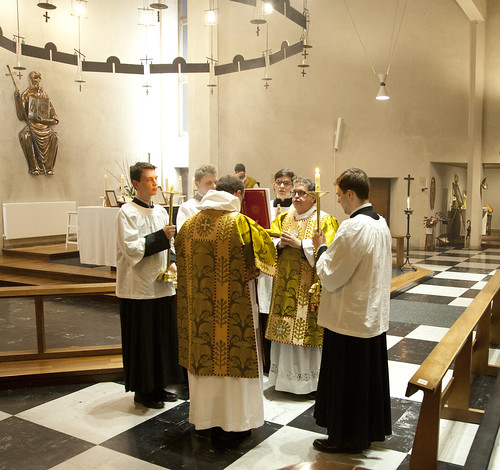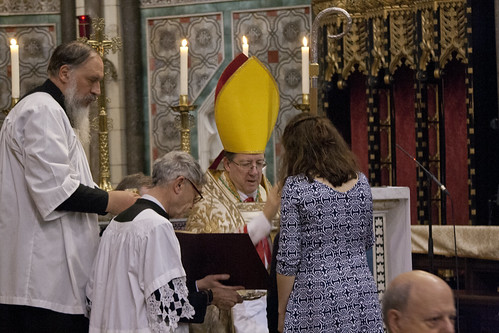Chairman's Blog
Cause for Celebration, 1: a reception into the Church and High Mass in Oxford
The architecture of Holy Rood is not what one might prefer but it does have an excellent acoustic and unimpeded sight-lines, and I got some nice photos of this lovely event.
The music was sponsored by the Latin Mass Society and the vestments used belong to the Society. They were purchased in memory of John Herbert and Josephine Smith, who left the Society a legacy. Please remember them, and our new recruit to the army of Christ.
Confirmations, the SSPX, and Allessandro Manzoni
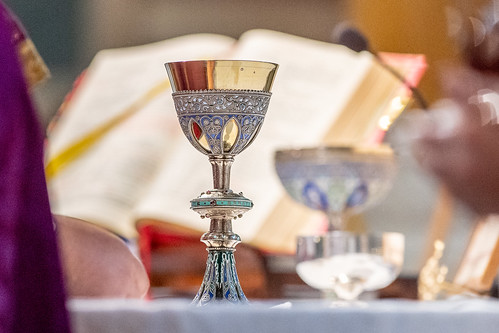 |
| Photo by John Aron |
One of the greatest Catholic works of literature, of any age and language, is Allessandro Mazoni's novel Il Promessi: the Betrothed. Among the characters is Frederick, Cardinal Borromeo, of Milan, the nephew of St Charles Borromeo; the simple village parish priest, Don Abbondio, and the engaged couple, Renzo and Lucy.
In the opening pages of the book a powerful local landowner threatens Don Abbondio with death should he marry the young couple; he has designs on Lucy. The couple attempt to force the issue, by contracting marriage before the priest as an unwilling witness. This would be recognised by the Church, under the canon law of the day, as valid but illicit.
Eventually, Cardinal Borromeo hears of the case and confronts Don Abbondio. The latter protests:
“But these persons who have told your lordship these things, have they not also told you that they introduced themselves treacherously into my house, for the purpose of compelling me to perform the marriage ceremony, in a manner unauthorised by the church?”
“They have told me, my son; but what afflicts and depresses me, is to see you still seeking excuses; still excusing yourself by accusing others; still accusing others of that which should have formed a part of your own confession. Who placed these unfortunates, I do not say under the necessity, but under the temptation, to do what they have? Would they have sought this irregular method, if the legitimate way had not been closed to them?”
It is interesting to note the forceful nature of the obligation to provide the sacraments, which the Cardinal insists on. Marriage, unlike Baptism and Confession, is not a 'sacrament of the dead': it is not a matter of spiritual life and death. And yet, all the same, the people have a right to it.
Earlier, the Cardinal had remonstrated with Don Abbondio. The latter protested:
“Perhaps I have not clearly explained myself. It was under pain of death that they ordered me not to perform the ceremony.”
“And this reason appeared sufficient to prevent the fulfilment of a rigorous duty?”
“I know my obligation is to do my duty, even to my greatest detriment; but when life is at stake——”
“And when you presented yourself to the church,” said Frederick, with increased severity of manner, “to be admitted to the holy ministry, were there any such reservations made? Were you told that the duties imposed by the ministry were free from every obstacle, exempt from every peril? Were you told that personal safety was to be the guide and limit of your duty? Were you not told expressly the reverse of all this? Were you not warned that you were sent as a lamb among wolves? Did you not even then know that there were violent men in the world, who would oppose you in the performance of your duty? He, whose example should be our guide, in imitation of whom we call ourselves shepherds, when he came on earth to accomplish the designs of his benevolence, did he pay regard to his own safety? And if your object be to preserve your miserable existence, at the expense of charity and duty, there was no necessity for your receiving holy unction, and entering into the priesthood. The world imparts this virtue, teaches this doctrine. What do I say? O shame! the world itself rejects it. It has likewise its laws, which prescribe good, and prohibit evil; it has also its gospel, a gospel of pride and hatred, which will not admit the love of life to be offered as a plea for the transgression of its laws. It commands, and is obeyed; but we, we children and messengers of the promise! what would become of the church, if your language was held by all your brethren? Where would she now be, if she had originally come forth with such doctrines?”
Today bishops and priests all over the world are steeling themselves to tell us--because this is the logical next step in the process unleashed by Traditionis Custodes--that we may not have many of the sacraments in the traditional form; that they are available from the SSPX (among others); to seek them from these would be, admittedly, valid, but, they will insist, illicit; and they cannot recommend such a step. Well, who could recommend such a thing?
It is certainly not for me to do so. I would just like to draw to the attention of these bishops and priests the words of Manzoni, placed in the mouth of the great Cardinal:
Who placed these unfortunates, I do not say under the necessity, but under the temptation, to do what they have? Would they have sought this irregular method, if the legitimate way had not been closed to them?
I would recommend those who seem so pleased with the prospect of Catholics attached to the traditional liturgical forms being driven out of the canonical structures of the Church to tear their minds away from the state of conscience these individuals may or may not have, and examine their own. Are you innocent here? Are your intentions charitable? Have you done what you could to preserve the unity of the Church?
They would do well to meditate on the words of Pope Benedict XVI:
Looking back over the past, to the divisions which in the course of the centuries have rent the Body of Christ, one continually has the impression that, at critical moments when divisions were coming about, not enough was done by the Church’s leaders to maintain or regain reconciliation and unity. One has the impression that omissions on the part of the Church have had their share of blame for the fact that these divisions were able to harden.
Support the Latin Mass Society
The LMS and the SSPX
 |
| I can't find an image of Houghton-Brown online, but he was an artist and this is by him: Richeldis founding the Holy House at Walsingham. |
The long-lost autobiography of Fr Bryan Houghton is being republished by Angelico Press. It contains a description of a famous meeting, which Fr Houghton attended himself, between the Chairman of the Latin Mass Society, Geoffrey Houghton-Brown, the President of Una Voce International, Eric de Saventhem, and some others, with Archbishop Lefebvre, in 1969. At this meeting it was agreed that Latin Mass Society/ Una Voce groups should stick to seeking permissions for the Traditional Mass from bishops and the Holy See, while the Archbishop, and the fledgling SSPX which he founded, could continue to act as he saw fit, with or without permission. (Fr Houghton was a cousin of Houghton-Brown, incidentally.)
I may say that this was not the first time that I met Monsignor Lefebvre. I had already met him (perhaps in the summer of 1969) at the Kenworthy-Browns. There had been present: Mr and Mrs Kenworthy-Brown, Monsignor Lefebvre, Mr and Mrs de Saventhem, Mr Geoffrey Houghton-Brown, Mr Vernor Miles (representing the Countess of Kinnoull) and myself. Monsignor’s lack of English was a bit of a bore, but luckily the de Saventhems, Geoffrey and I were fluent in French, and the Kenworthy-Browns understood most of it, although a bit tongue-tied. But poor Vernor Miles was still at school-French: “My aunt’s pen: la plume de ma tante.” This was perhaps rather fortunate—divine Providence. Monsignor Lefebvre wanted money to start up in England in a big way. Now, Vernor Miles represented Lady Kinnoull, who had one of the biggest Catholic fortunes in England. It had been left to her by her husband and she was childless. At the crucial moment Mr Vernor Miles was unable to understand.Anyway, the problem was: whether the Latin Mass Society should associate itself with Lefebvre or not? It was decided that the two organisations should remain divided: the LMS trying to get the hierarchy to admit the old Mass; Lefebvre producing the old Mass in spite of the hierarchy. I felt quite sure that this was the right decision.
Learn Latin and become a citizen of Europe
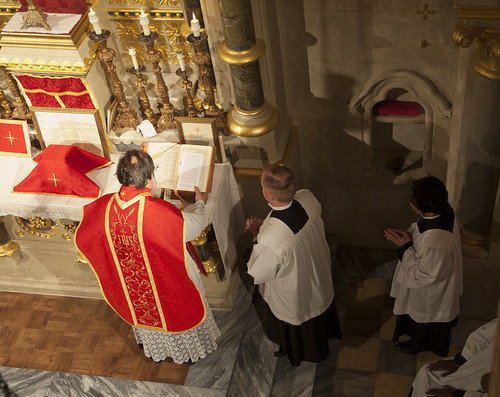 |
| Reading the Epistle: Fr Gabriel Diaz at Corpus Christi, Maiden Lane |
And here is an unexpected, but perfectly logical, new reason for learning Latin and Greek, which appeared in the press before the Christmas rush but is worth repeating.
Jean-Michel Blanquer, France's Education Minister, is re-introducing the study of Latin and Greek into France's professional schools: it will be possible to study them as part of the 'technical' baccalaureate. This is part of an international effort to 'strengthen the EU', alongside Italy, Greece and Cyprus.
Here is The Times, here is The Telegraph: both paywalled; here's a parallel report from RT.
It is part of President Macron's 'war on woke', apparently. Blanquer ridiculed the idea that teaching Latin promotes racism, which, predictably enough, has found a home in the once-elite University of Princeton.
Obviously one has to reject such an idea if one wants to promote the study of the Classics. But Blanquer's motivation is about putting young people in touch with the common cultural roots of Europe.
A similar idea was recently expressed in Le Figaro, where Sundar Ramanadane suggested that Latin be the language of the EU's institutions. Seriously! After all:
Latin carries within it two millennia of a culture as varied as its authors were: it was the link between a Europe of minds who, through time and across space, have debated, disputed, but always with a common identity as a backdrop. Latin also structured the languages we speak today in Europe, in their grammatical construction or in their lexicon: it crosses national boundaries.
...
Finally, a Latin-speaking Europe would symbolize the strength, rigour, and will to power (something that Europe has recently attempting, albeit timidly, to assume), the will to unite many peoples around it. It would then be the language of an entity which would have another ambition than that of being a cartel of states representing, for the largest of them, just over one percent of the world's population.
So 'Latin deserves to become the language of Europe again.'
He concludes:
If Europe one day aspires to develop a European identity beyond national characteristics, and to be something other than a grant-giver and a great regulator, (things that are not criticized in themselves), it must acquire a language which, unlike this laboratory language that is Esperanto, has a rich history, and reflects a historical legacy in which the peoples recognize themselves and under which they can consider uniting.
Support the Latin Mass Society
Confirmations: Being Stricter than the Law
Since 2004, with a break in 2020 for COVID, the Archdiocese of Westminster has supplied an auxiliary bishop to confer the Sacrament of Confirmation according to the 1962 liturgical books. In the 16 services which have taken place over 17 years, 593 candidates have been confirmed using this rite. These services were open to Catholics from all over England and Wales, and indeed beyond: occasionally we had candidates from Scotland and France. As time has gone on several other bishops have plucked up the courage to hold confirmation services in their own dioceses. One such was due to take place in just a couple of weeks, 6th February, in the Oratory at Birmingham.
These have now all been cancelled. It seems the bishops of England and Wales had a meeting, online, and decided that they must not be allowed, under the terms of the Responsa ad dubia, which the Congregation for Divine Worship published before Christmas. The Responsa ruled out the use of the older Pontifical, the liturgical book which contains the Rite of Confirmation, and also the Roman Ritual. Neither of these books was mentioned in Pope Francis’ Apostolic Letter, Traditionis Custodes. It is not clear how or why a Roman Congregation, supposedly interpreting Pope Francis’ document, is adding entirely new regulations not found in the original. They are, we might say, being stricter than the law.
Bishops in England and Wales, and around the world, have in any case the authority to abrogate from the universal law of the Church for the good of souls, under Canon 87.1. They referred to this Canon in addressing the problem thrown up by Traditionis Custodes, which appeared to say that parish churches should not be used for the traditional Mass, when the overwhelming majority of such masses are being celebrated in parish churches, with no practical alternatives available. This Canon has not been changed. If bishops, who can see the harm done to the good of souls by a strict implementation of the Responsa which itself does not have the force of law, want to implement it anyway, they themselves are being stricter than the law.
Traditional Confirmations cancelled in England and Wales
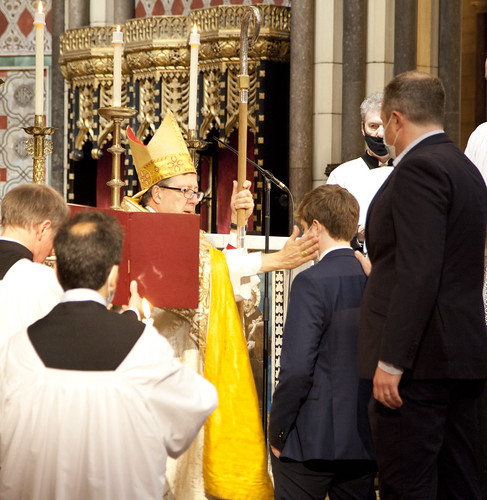 |
| Bishop Sherrington, an auxiliary bishop of Westminster Diocese, administers the confirmation 'slap'. He wears a cope and mitre, and holds a crozier, symbols of his office. |
Latin Mass Society Statement on Confirmations: January 2022
The Latin Mass Society regrets to report that Cardinal Vincent Nichols has made the decision (communicated to the Society by letter) that the Sacrament of Confirmation is not to be celebrated according to the 1962 liturgical books in the Archdiocese of Westminster. The annual celebration which has for nearly twenty years been organised by the Latin Mass Society at St James’ Spanish Place, at which candidates were confirmed by an auxiliary bishop of the Archdiocese—and on one occasion, by Cardinal Raymond Burke—will accordingly not take place this year, or until this decision is reversed.
We understand that another planned celebration of this Sacrament, by Archbishop Bernard Longley of Birmingham, has also been cancelled.
Comment from Joseph Shaw, LMS Chairman.
The Archdiocese of Westminster has provided an auxiliary bishop to confer Old Rite Confirmation annually since 2004. In recent years bishops in several other English dioceses have also organised traditional Confirmations in other parts of the country. These celebrations have been joyful occasions, attended by many children and young adults, their families, sponsors, and friends. They have been clear expressions of the importance the Society’s supporters attach to their link with their bishops, and our bishops’ pastoral concern for us. They have enormously strengthened the sense of unity in the Church: both our sense of belonging, and, I believe, the bishops’ own sense that we are indeed sheep of their flock.
The cessation of these celebrations implies the loss of much that the Bishops of England and Wales have sought, and achieved, in establishing a serene co-existence between the new and old liturgical forms. Confirmation is above all a sacrament for young people and converts. It will cut off many from accessing it in a form ‘particularly suited to them’ (as Pope Benedict expressed it).[1] Others will be driven to seek it outside the structures of the Church.
We hope that the Bishops of England and Wales come to reconsider their decision, and allow once more the ancient Roman liturgy in all its manifestations to be part of the legitimate diversity of liturgical forms we have in this country.
Ends.
————————————————————
Comment
Reading of the difficulties and conflicts between groups of the faithful attached to the Traditional Mass and their bishops, in some parts of the world, we have long been able to say, in England and Wales: this is not the situation here. With regard to Confirmation, and in many other ways, our bishops have shown themselves willing to see us cared for using those liturgical forms which are, as Pope Benedict called them, ‘treasures’, which attract us because of their ‘sacrality’, and in which we are ‘formed’ (Letter to Bishops, 2007).
This is no longer the case. While this situation continues, it is implied that the liturgy of the Saints, Doctors, Martyrs, and holy Popes of twelve centuries and more is suspect, and that we ourselves are not worthy of the pastoral consideration given to all sorts of groups in this country: Polish Catholics, Syro-Malabar Catholics, Ukrainian Rite Catholics, and many others, who receive pastoral care distinct from the standard English-language Novus Ordo liturgy.
I hope the Bishops of England and Wales appreciate the deeply problematic nature of this situation, particularly in light of the steps which Pope Francis has taken to legitimise the ministry of the Society of St Pius X, whose members will not feel themselves bound to observe any restrictions on the use of the Traditional Sacraments.
In light of the Canon law guidance which we have published, which confirms that the recent Responsa ad Dubia issued by the Congregation for Divine Worship, which appear to prohibit the use of the 1962 Pontificale, does not have the force of law, we call on His Eminence, Cardinal Nichols, and the Bishops of England and Wales, to reconsider their position, before real pastoral harm is done, and damage to the fabric of unity which will not easily be repaired.
Server Training in London: February, April, May
 |
| Server training in St Mary Moorfields |
Cross-posted from the Society of St Tarcisius blog.
We have booked dates for the first half of the year as follows:
26th February, St Mary Moorfields, from 10:30 am to 4pm. Booking page.
2nd April, St Dominic's Haverstock Hill, from 11 am to 4pm (please come to the parish hall on the left of the church). Booking page. Note the new venue!
21st May, St Mary Moorfield, from 10:30 am to 4pm. Booking page.
St Mary Moorfield's is 4/5 Eldon Street, London EC2M 2LS: more on the venue.
St Dominic's Priory is at Southampton Rd, NW5 4LB: more on the venue.
div>
Are Traditional Catholics 'corrupt'? A response to Austen Ivereigh
 |
| Mass of Reparation, celebrated in response to clerical abuse revelations in 2018. |
Austen Ivereigh writes that he has been troubled by a criticism of the restrictions on the Traditional Mass brought in last July by Pope Francis' Traditionis Custodes. This is the point, made even by people with no particular interest in the ancient Mass, that it was an example of collective punishment: the innocent were being deprived of the Mass alongside those, whoever they are, who are truly guilty, of whatever it is they are supposed to be guilty of. Even if we accept Pope Francis' characterisation of Bad Trads, it can't be true of everyone who has derived solace from the old Mass. It can't, in fact, even be true of most, because it implies a degree of theological engagement which is unusual. Most Catholics don't spend their time talking about Vatican II's teaching on Religious Liberty, for example, because most Catholics, whether they have encountered the old Mass or not, don't have a very clear idea of what it is -- the idea is absurd.
Furthermore, we have been told over and over again that Pope Francis is all about 'dialogue', 'meeting people where they are', not expecting people to be perfect, seeing the Church as a 'field hospital', not 'throwing stones' and all the rest of it. His treatment of Catholics attached to the Old Mass seems, to put it mildly, in tension with this
Ivereigh quotes Greg Hillis: “At a time when we as a church are embarking on a synodal path,” Hillis wrote, “I have difficulty understanding why a more synodal—a more dialogical—approach is not being taken with traditionalists.”
This 'nagged' at Ivereigh, he tells us. But he has come up with a solution. He has dug up something written by the Pope back in 1991, which distinguished 'sin' from 'corruption':
Hence, writes Bergoglio, “we could say that while sin is forgiven, corruption cannot be forgiven,” for at the root of corruption is a refusal of God’s forgiveness. The corrupted person or organization sees no need of repentance, and their sense of self-sufficiency gradually comes to be regarded as natural and normal.
This is the use of words not with the usual meanings, but let's go with that. The first problem is that it is no clearer than before that all, or a majority, or even an important minority of Catholics who attend Mass regularly or occasionally in the Old Rite should be categorised in this way. It is still an unjust collective punishment. Ivereigh deals with this, however, by saying that the rest of us are guilty by association because we have not attacked the guilty ones.
Conversely, the sinner—even when not ready to repent—knows that he is a sinner and yearns to throw himself on God’s mercy. This is the key distinction: the sinner remains, however obscurely and unconsciously, open to grace, while the corrupt deny that they sin. Enclosed by their pride, they shut out the possibility of grace.
“We are ready to convert if party spirit or pride has polluted our hearts.” Why if and may? Isn’t “party spirit and pride” one thing traditionalism has become famous for?
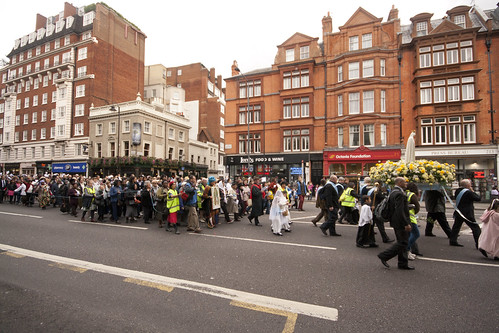 |
| Rosary Crusade of Reparation in London. |
Support the Latin Mass Society
Iota Unum 2022 Season
 |
| Prof Tom Pink |
Please come to the Golden Square entrance directly to the basement: 24 Golden Square, W1F 9JR, near Piccadilly Tube Station (click for a map)
Thomas Pink is a Professor in Philosophy at King's College London and a Patron of the Latin Mass Society. He has a particular interest in the history of theology in the early modern and modern periods, on religious liberty and the role of the Papacy.
Friday April 29th, David Hunt ‘The perennial sin of Usury’
 |
| David Hunt |
David Hunt studied at the International Theological Institute in Austria to study philosophy and theology, and recently completed an MA in Philosophy at the University of Buckingham with a thesis titled ‘Usury Redux: A defence of the scholastic position on usury’. David lives in Kent with his wife and five children.
Friday May 27th, Dr Jeremy Pilch ‘St John Henry Newman and Our Lady Mediatrix of All Graces’
 |
| Jeremy Pilch |
 |
| Tim Stanley |
Dr Stanley is a well-known historian and journalist, and author of the recent Whatever Happened to Tradition?
Support the Latin Mass Society
The attack on Latin: Tito Casini
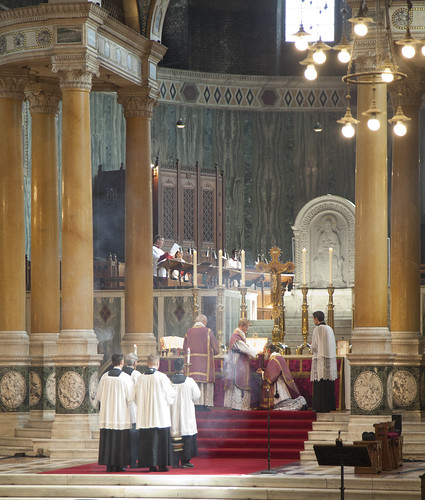 |
| The celebrant blesses the deacon before the latter proclaims the Gospel at High Mass. LMS Annual Mass for our Annual General Meeting in Westminster Cathedral, 2021 |
I have been reading the Traditionalist classic, Tito Cassini’s The Torn Tunic, first published (in Italian, La Tunica Stracciata) in 1967, reprinted by Angelico Press. It is an impassioned, indeed ferocious, statement of the case for liturgical traditionalism, written and published before the Novus Ordo Missae was promulgated. Casini, like most Catholics of the time, has only the vaguest idea what further changes were being cooked up. What he was objecting to was the things which had already been done, notably by the 1964 Instruction Inter Oecumenici, and the liturgical abuses which had been springing up. Casini’s focus, like that of the Latin Mass Societies and Una Voce groups which were founded as early as 1964, was the use of the Latin language.

